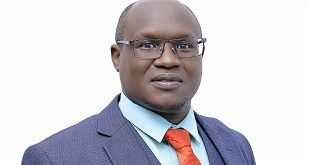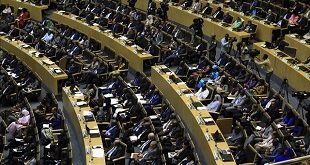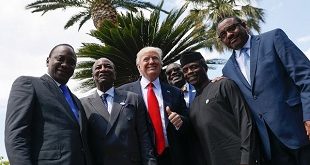
By Mubatsi Asinja Habati
Hardly two months after an Afrobarometer opinion poll indicted President Yoweri Museveni’s management of Uganda and provoked the ire of First Lady Janet Museveni, another poll has arrived at a similar conclusion: Most Ugandans want the old man out.
Near the top of the list of new favourites for president is the First Lady herself, coming only second to Parliament Speaker Rebecca Kadaga, but ahead of former Vice President Gilbert Bukenya and Prime Minister Amama Mbabazi.

The Afrobarometer survey, conducted between November and December 2011, said 75% of Ugandans believed the country was headed in the wrong direction, largely because of poor economic performance. Research World International Ltd (RWI)’s poll is even more specific: 81% of Ugandans say they are worse off economically than they were before the 2011 election; 56% want Museveni’s name nowhere near the next presidential ballot paper.
The RWI poll, conducted between March 19 and April 6, 2012, relies on the opinions of 1,300 Ugandans above 18 years regarding President Museveni’s performance a year after the 2011 election, which he won with 68% of the vote. That election had the lowest voter turnout (58% of registered) ever, so statistically Museveni won with the support of only 39% of Uganda’s voters. But soon after Museveni’s victory was declared, inflation hit its worst record in 20 years and economic growth began a still-ongoing downward spiral.
The political opposition, led by Forum for Democratic Change President Dr Kizza Besigye and the advocacy group Activists for Change (renamed For God and My Country), has exploited the economic turmoil to galvanise public anger and protest, but has largely been unable to articulate an alternative vision, especially on the economy, according to the poll.
64% of respondents said they were dissatisfied with the economy, especially the poor state of services like education, health and transport, as well as the high incidence of corruption, and would not vote for President Museveni if an election were organised. Ironically, the opposition did not seem to be gaining from Museveni and NRM’s apparent decline, as only about 22% of respondents said they would vote for the main opposition leader, Kiiza Besigye.
Partly because RWI is new on the political polling scene, some critics have raised suspicion regarding the poll’s intent and credibility, arguing that it could have been staged to derail legitimate discussion of a successor to President Museveni in 2016. The emergence of Kadaga and the First Lady as top favourites in a country where women still appear to play only marginal roles in politics, has also raised eye-brows. Kadaga’s popularity is seen to have been born of her steering of the anti-corruption stance the 9th Parliament took in its first year, especially in the oil debate which cast the spotlight on three ministers, including the Prime Minister Amama Mbabazi. That debate forced government to expedite the tabling of oil laws to guide the management of Uganda’s oil resource, but it also drove a wedge between the Speaker of Parliament and the Prime Minister that political analysts have interpreted to be part of the wider contention for succession in the ruling party.
Journalist Angelo Izama, who was closely involved in the launch of the poll report, said Kadaga, who has often been reported to butt heads with big wigs in the ruling party, was largely “a media creation”, and her first-place showing in the poll could be attributed to the favourable media reporting she had generated in her first years as speaker of Parliament and was not be reflective of her true support within the NRM.
By seeming to re-arrange the political scene (in people’s minds) on its debut into the opinion poll market, RWI is seen by some critics as positioning itself to call the shots on polling the 2016 elections. This is especially because polls by internationally reputed research firm, Afrobarometer, and Synovate, provided a big campaign boost for the ruling NRM party, which used their results to position itself to voters as the indisputably leading brand of the Feb. 2011 presidential election.
However, RWI Chief Executive Officer Dr Patrick Wakida says anyone who dismisses the poll’s findings is burying their heads in the sand. Instead, he urges political parties to focus on wooing the 42% undecided voters, and on cleaning up the electoral register on which 39% of respondents who did not vote said they found their names missing.
Wakida told The Independent that RWI seeks to contest the dominance of the opinion polling business by foreign-owned research companies, whose understanding of Ugandans and their aspirations may be wanting. He said his firm was planning to conduct many more opinion polls between now and 2016 to help the ruling NRM and the opposition to better position themselves to voters.
Research doesn’t lie
Dr Bruno Ocaya, head of Makerere’s Department of Statistics and Actuarial Sciences, says the writing is on the wall for President Museveni, as research does not lie. Dr Ocaya said the poll corroborated earlier statistics, yet one did not need a poll to conclude that Ugandans want Museveni to retire.
“One doesn’t have to wait for a poll to know that times have changed,” Dr. Ocaya told The Independent. “It is important to recognize the voices coming from rural areas urging him to quit. For us in the research world we know what is happening on the ground and figures never lie. People are looking forward to other choices.”
Some critics say the poll results may have been influenced by prevailing sentiments of the time it was conducted, when religious leaders and Members of Parliament called for Museveni’s exit and the re-instatement of presidential term limits through a re-amendment of the Constitution. Museveni rubbished this debate as “nonsense”, saying the decision to oust him was up to his party. Indeed, the poll says 57% of Ugandans think Museveni will not leave power voluntarily.
“We have always said NRM party holds the key to this discussion and it will decide its presidential candidate at the right time just like we can’t tell other political parties which candidates to field in elections,” Government Spokeswoman Mary Karoro Okurut said.
FDC’s Vice President for Eastern Uganda, Salaam Musumba, said while she agreed with some of the poll’s findings, her party would study it more closely to understand what the “game changer in Uganda’s politics will be, and mobilize the people rigorously for change”.
Although 25% of respondents said the opposition lost in the previous presidential election because of rigging, 20% believed its messages were not appealing and 13% said the opposition presidential candidates did not put forward attractive campaign platforms to turn voters’ dissatisfaction with the incumbent into votes.
The pollster says most people feel the opposition is not firm on ground and is doing very little to increase its support among ordinary Ugandans. For example, most respondents did not agree with the opposition protest of Walk-to-Work as a solution to their most pressing problems.
The poll also revealed that many voters were pessimistic about the electoral process and wanted Parliament to institute reforms at the Electoral Commission to facilitate a freer and fairer election.
Citizen discontent
Regarding citizen dissatisfaction with the first year of Museveni’s 5-year term, the findings of the poll resonate with those of the Citizen Manifesto 2011 – 2016 released recently, in which members of the public say the ruling party which constitutes government has not delivered on its election campaign promises.
“The government’s crackdown on the walk-to -work protests as well as the general suppression of assemblies since February 2011 elections, coupled with laws that are being drafted such as the Public Order Management Bill and Uganda Communications Regulatory Authority 2012, are widely seen as a reversal of the democratic guarantees that are enshrined in the Constitution,” said the report launched recently.
“Regarding to the promise to increase economic growth to more than 10 per cent per annum, economic growth and GDP per capita growth have instead been declining over time,” the Citizen’s Manifesto said. “The growth rate for 2011/12 is estimated at just about 5 per cent as against National Development Plan projection of 7 per cent.”
The audit, implemented by the Uganda Governance Monitoring Platform (UGMP), which works by matching promises in the President’s manifesto with the demands of citizens and designing indicators to track if these are delivered, found that many citizens were of the view that neither political nor economic promises had been met.


 The Independent Uganda: You get the Truth we Pay the Price
The Independent Uganda: You get the Truth we Pay the Price


